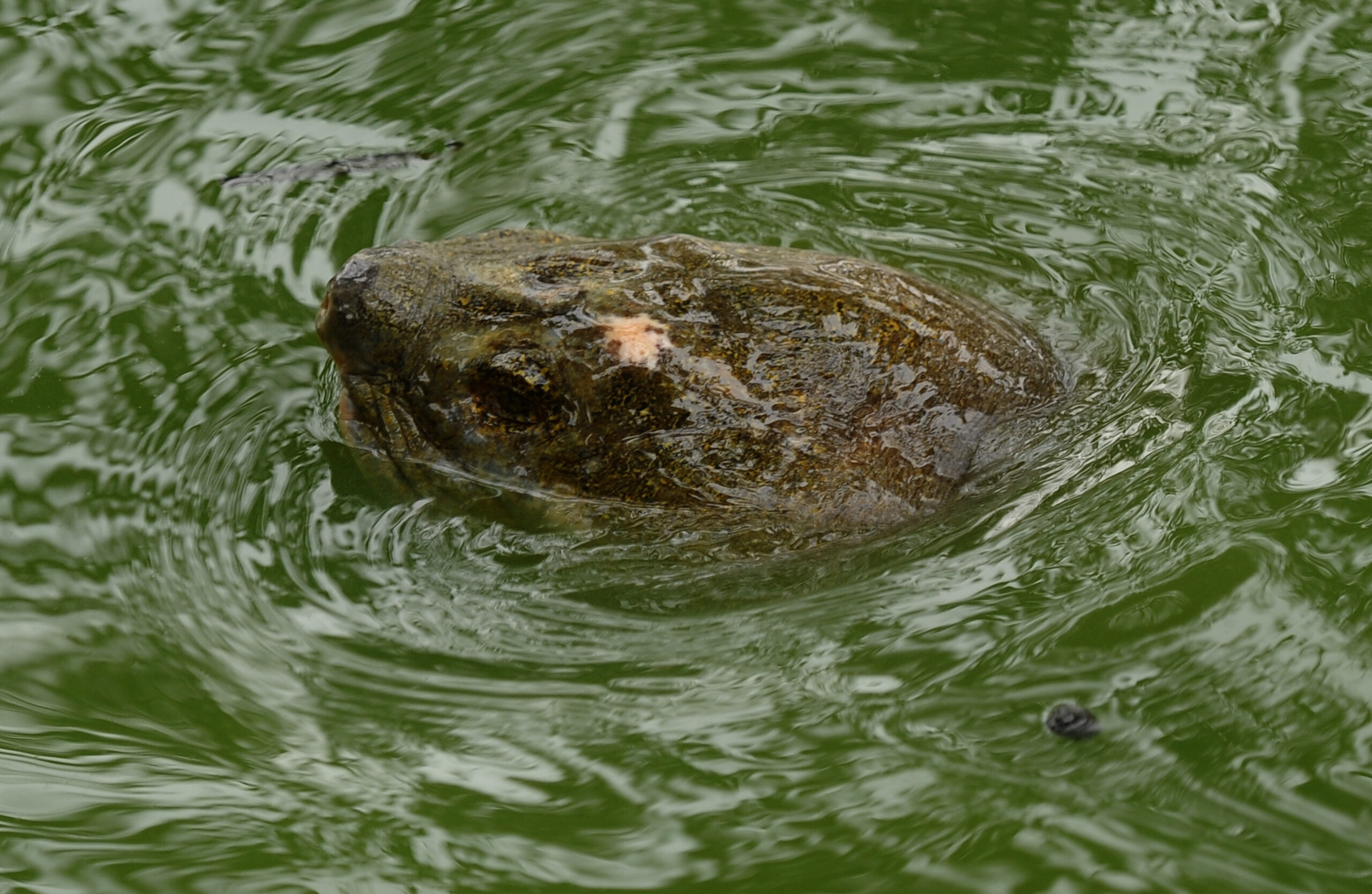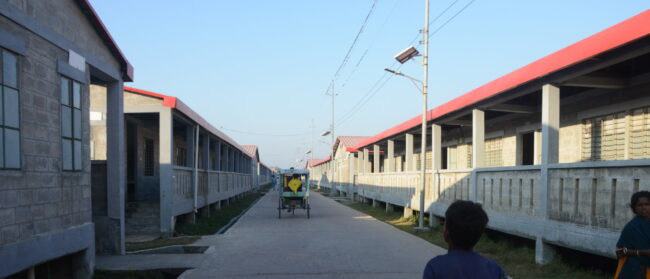Before Thong Pham was born, there was an abundance of turtles in the marshy lowlands of his hometown in Ninh Binh Province.
“My grandmother said that right next to my house in the flat area it used to have a lot of turtles. They climbed into the yard, and climbed into the house and also were running around the garden,” said Pham, research manager with non-profit Save Vietnam’s Wildlife.
“When I was growing up, I never saw any turtles.”
Vietnam has 25 species of freshwater turtles and tortoises. But the country’s diverse turtle populations have declined rapidly. Historically driven by habitat loss and demand for wild animal products across the border in China, turtle conservation efforts are facing new challenges. Exotic pets have become increasingly popular in Vietnam and trafficking has moved online.
Some of the world’s most endangered turtles are being sold on Facebook and YouTube.
A survey from two Hanoi-based environmental non-profit organisations – the Asian Turtle Program and People and Nature Reconciliation (Pan Nature) – focused on turtle sales on the two online platforms in 2021.
The non-profits found a variety of endangered and vulnerable native and exotic turtles for sale on the sites. For the researchers, three native species stood out: the Vietnamese Pond Turtle, the Elongated Tortoise, and the Mekong snail-eating turtle.
These species are nearing extinction in the wild – listed as critically-endangered by the International Union for Conservation of Nature (IUCN) Red List of threatened species. The Vietnamese Pond Turtle is endemic to Vietnam with no natural habitat outside of the country’s central wetlands and is among the world’s top 25 most-endangered turtles.
The difficulty of protecting these species is exacerbated by the nature of the online trade. Social media gives traffickers ample opportunities to circumvent the law and a wide advertising base, Pan Nature’s communication officer To Bich Ngoc told the Globe.
“It is very difficult to monitor, detect and handle turtles on social networks,” Bich Ngoc said. “The transactions are done easily and are less subject to the supervision of the authorities.”

Turtle crisis
The plight of Vietnam’s turtle species goes back decades. With wild populations plummeting, researchers say some of the critically-endangered native turtles sold online are bred in illegal turtle farms.
Ha Hoang, program coordinator at the Asian Turtle Program, links the threats faced by Vietnam’s native turtles to a decades-long trend: the Asian turtle crisis. Starting in the 1980s, the crisis is marked by a precipitous decline in Asian turtle populations caused by years of habitat destruction and overexploitation.
Through his 14 years in turtle conservation, Hoang has followed the fate of the Vietnamese pond turtle. Marked with yellow stripes down the side of its head and growing up to 18 centimetres (8 inches), the turtle is emblematic of the Asian turtle crisis.

Although having a single habitat in a small area of central Vietnam, a researcher photographed the species at a Beijing turtle market in 1995.
“It was very early for the Asian turtle crisis to be happening in Vietnam and you can already see that the Vietnamese Pond turtle had already been caught and traded into China,” Hoang said, noting the turtle was also trafficked into Europe, the United States, and Japan.
“It shows the turtle has been suffering from the illegal trade for a long time.”
The most critical time for this species was about 10 years ago when the market price for the pond turtles skyrocketed, he noted. With prices for a single turtle at nearly $2,500, the turtles were hunted aggressively.
The turtle has been suffering from the illegal trade for a long time.”
Ha Hoang, program coordinator, Asian Turtle Program
“It’s a really big number for local people who only earn a few dollars per day. At that time people quit their jobs and were… going into the wetland area to hunt for this species,” Hoang said. “It has been hunted I think to the full extent in the wild now.”
Although the price for the endemic turtle has dropped, they are now believed to be extinct in their natural habitat. Still, there are over 1,000 individuals living in captivity in northern Cuc Phuong National Park’s turtle conservation area. Efforts to raise funds for a protected area to release these turtles into their natural habitat have not yet been successful.
From Hoang’s understanding, the individuals sold on Facebook are sourced from illegal breeding farms. Although a positive that the species has not completely disappeared, he worries about the conditions in farms for the Vietnamese pond turtle and other native species.
Turtles are kept in poor conditions, he explained. Parents and offspring mate which is dangerous for the long-term health of the species and breeders create hybrid species to combine different turtle’s characteristics to increase their value in the pet trade.

Hoang said illegal turtle farms are difficult for authorities to crack down on. He compares it to government efforts to shut down the country’s bear bile farms. Turtles’ diminutive size makes these farms even more difficult to manage.
“There are nearly 300,000 individuals of 11 turtle species [in farms]. Most of them are critically endangered or endangered and are being kept in the farm. But in the wild they are still facing the risk of extinction every day,” Hoang stated.
“Tackling bear bile farms is very difficult to manage even though they are very significant in size for turtles it can’t be managed by the same approach. It is the next challenge for local authorities.”

Online pet trade
The turtle trade has come a long way since Pham of Save Vietnam’s Wildlife began interviewing poachers for his research.
In the past, hunters could collect large numbers of turtles in a single day.
“Some of the hunters, if they wanted to go to the forest for one day they could collect a rice sack bag full of turtles,” Pham said. “Now if they go to the forest for one week or two weeks they can only find a few turtles.”
Save Vietnam’s Wildlife is still focused on the protection of natural habitats with forest guards stationed in national parks across the country, but the pet trade and turtle farms are increasing concerns for conservationists.
Turtles have become popular as pets in Vietnam. The variety of colours, sizes, and shapes of turtles make them trendy pets for busy young people in urban centres, Bich Ngoc of Pan Nature said.
The majority of the turtle pet trade occurs in Vietnam’s capital, Hanoi and southern economic centre, Ho Chi Minh City. Without much space for pets in the bustling cities or time to care for cats and dogs with busy schedules, turtles are an inviting companion.
But keeping turtles is more than a benign hobby, Hoang said. The pet trade increases demand for native and harmful exotic species and many turtles die when owners do not know how to care for the species. Sometimes, turtle keepers with sick pets give animals to conservation groups but at that point, they are often too ill to save.
“For one turtle pet keeper, for those who can keep and raise one turtle successfully, at least a dozen turtles have died before that,” Hoang noted. “They are weak and old when they return [turtles] to the conservations. By that time it is very difficult to rescue those turtles and to save them.”
With the rising popularity of social media, traders have new means to promote their business while subverting local authorities and loopholes in Facebook and YouTube’s content moderation policies.
Traders withhold their identities and locales, transactions are made through private messages, and intermediary logistics providers are hired to transport turtles falsely listed as other goods. Further, sellers set up multiple accounts across platforms to increase sales and to keep operations going if one account or page is forced to close.
Although Facebook and YouTube have policies and filtration tools to prevent illegal animal sales, traders are savvy at working around the companies’ community standards. Further, the study found that Facebook allows advertising tools to be used by turtle traders.
“Facebook does not restrict advertising to pages that sell turtles, so many shop owners have used Facebook’s advertising tools to reach users and increase their potential customers,” said Bich Ngoc. .
“Turtle markets on social networks in Vietnam are very active, of which 2021 is the strongest growth year.”
The survey found that in 2021, there were over 96 Facebook pages and 200 Facebook groups that often posted activities related to captive breeding and the trade of turtles, and 97 YouTube videos that advertised turtles. TikTok and popular Vietnamese messaging app Zalo are also thronged with turtle sales, Bich Ngoc added.
“Pan Nature already sent a letter to YouTube Vietnam and Facebook Vietnam mentioning those tricks from the users,” Hoang said. “I think they need to be more strong on this because without those actions I don’t think the trade can be stopped.”
Meta, Facebook’s parent company, responded to the Globe by asking for Facebook content related to illegal turtle sales. The spokesperson did not provide comment by the time of publication. YouTube did not respond to requests for comment.
“Without successfully tackling the illegal trade I don’t think conservation can be successful,” Hoang said.


